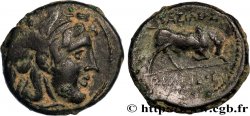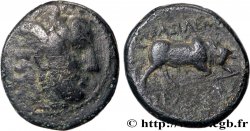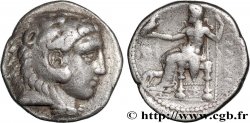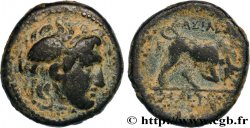v36_0210 - SIRIA - REGNO DI SIRIA - SELEUCO I NICATOR Tétradrachme
MONNAIES 36 (2008)
Начальная цена : 950.00 €
Назначить цену : 1 500.00 €
Цена реализации : 1 212.00 €
Количество ставок : 3
Максимальная предлагаемая цена : 1 212.00 €
Начальная цена : 950.00 €
Назначить цену : 1 500.00 €
Цена реализации : 1 212.00 €
Количество ставок : 3
Максимальная предлагаемая цена : 1 212.00 €
Тип Tétradrachme
Дата: 296-295 AC.
Монетный двор / Город: Babylonie, Séleucie du Tigre
Металл: silver
Диаметр: 28,5 mm
Ориентация осей монеты: 3 h.
Вес: 16,36 g.
Редкость: R2
Комментарии о состоянии
Très bel exemplaire pour ce type de monnayage sur un flan large, bien centré des deux côtés avec le grènetis complet au droit. Très beau portrait. Petite faiblesse de frappe au revers. Jolie patine de collection ancienne avec une patine grise
Ссылки в каталоге: :
Лицевая сторона
Аверс: легенда: ANÉPIGRAPHE.
Аверс: описание: Tête laurée de Zeus à droite.
Обратная сторона
Реверс: Описание: Athéna, casquée et vêtue militairement debout à droite dans un char tiré par quatre éléphants, brandissant un foudre de la main droite et tenant un bouclier de la main gauche ; au dessus du quadrige, une ancre ; à droite, un monogramme.
Реверс: легенда: [BASILEWS// SELEUKOU/ (RHA)
Реверс: перевод: (Roi Séleucus).
Комментарий
Notre exemplaire présente une petite variante de monogramme par rapport aux exemplaires décrits par A. Houghton et C. Lorber.
Our example has a slight variation in monogram compared to the examples described by A. Houghton and C. Lorber
Our example has a slight variation in monogram compared to the examples described by A. Houghton and C. Lorber








 Cообщить об ошибке
Cообщить об ошибке Распечатать страницу
Распечатать страницу Отправить мой выбор
Отправить мой выбор Задать вопрос
Задать вопрос Consign / sell
Consign / sell
 Информация
Информация









